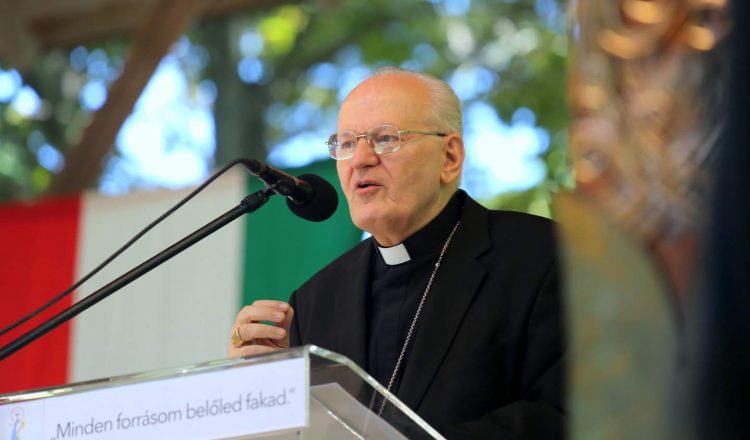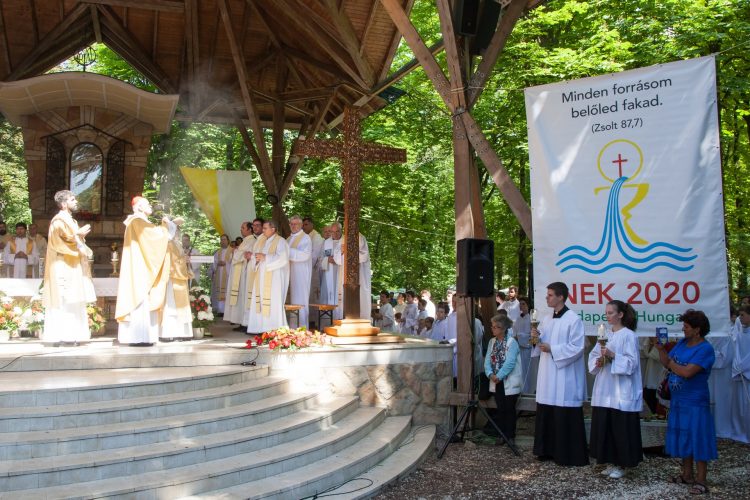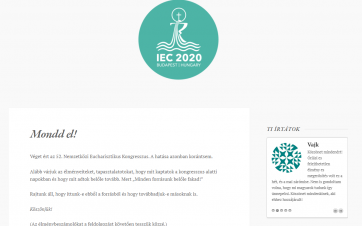4. So, the basis and centre of the veneration of the Eucharist is the meeting with Christ. We are no contemporaries to the Jesus of Nazareth. We cannot walk with him on the dusty roads of the Holy Land, we could not hear his teaching words, which was both temptingly attractive and unusually powerful. His contemporaries recorded that "unlike the scribes, he taught them with authority" (Mk 1,22). But we, the children of the late ages, we have three ways to meet Christ, just like the disciples of Emmaus. They met Jesus on the road, but they did not recognise him. But later, their hearts started to burn, when he explained the Scripture to them, when he de told them that the prophecies of the Old Testament are about him. But then they recognised him in the breaking of the bread. This encounter urged them to return to Jerusalem, to the community of the disciples, who also confirmed the resurrection. We also can meet Christ in the message of the Scriptures, in the Eucharist, in the community of the Church. And after that our helping love will be again and again the source and confirmation of our own faith.
This is, where our testimony in front of the world begins. First, our Christian community becomes like the one in the time of the Apostles. About them we read in the Acts of the Apostles that they "remained faithful to the teaching of the apostles, to the brotherhood, to the breaking of bread and to the prayers" (Acts 2,42). So the teaching is important, that teaching which came to us from the Apostles, through the Church. The community is also important, so is the prayer and the breaking of bread, that is the Eucharist, which has been in the centre for the community of the Church from the very beginnings.
5. But for all this, we need conversion. That is why the Mission cross goes from town to town, to call our attention to the sacrifice and resurrection of Christ. To remind us, with whom we shall join our live if we want to be truly and eternally happy. The cross is not only the symbol of suffering, but also of the resurrection. "Vexilla regis prodeunt." - Abroad the Regal Banners fly. We consider the cross as a sign of victory. The protection of God, the promise of resurrection, a memory and a reminder. An in our Mission cross there are the relics of the saints and blessed of Hungary and our surroundings. Their remains they evoke the example of their lives, sufferings and testimonies. They way of the Mission cross is accompanied by an exhibition, which brings the particular saints, their special charisma and messages closer to the people of our age. We shall receive this cross everywhere with our prayers. We shall follow the way of the Mission cross with meditation, adoration, and - if possible - with the acts of helping love. We shall heed to the pictures of the exhibition. Ask for their intercession and help, so that we also may follow their example.
Christ calls everyone to holiness. Not only to some minor or greater attempts. Not only to a half-hearted attempt of conversion, in the success of which we ourselves do not trust. He calls us to perfection, just like the saints, and to this he offers the infinite source of his divine grace, his own pierced heart, from which blood and water poured out, and from its love the unfailing source of the baptism and Eucharist comes. The mysterious promise of the Psalmist about the eternal, shining Jerusalem is fulfilled in it: "all my springs are in you" (Psalms 87,7). As we read in the Book of Revelations: "Then the angel showed me the river of life, rising from the throne of God and of the Lamb and flowing crystal-clear" (Rev 22,1). The city wall had twelve gates, and over the gates were written the names of the twelve tribes of Israel; The city walls stood on twelve foundation stones, each one of which bore the name of one of the twelve apostles of the Lamb. (Rev 21,12-14). Every nation is invited to this city. This is the merit of our good news. There is no Christian, who is not invited to pass this good news to every people.
Because the world needs Christ. The world needs us too, because we belong to Christ! Amen."












